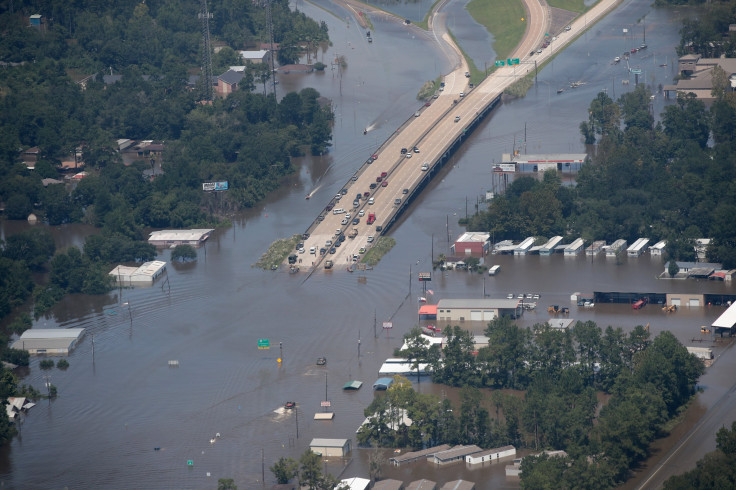Hurricane Harvey Survivor Dies Of Flesh-Eating Bacteria

A survivor of Hurricane Harvey, which rocked Houston just weeks ago and caused catastrophic damage, died this month from the flesh-eating bacteria known as necrotizing fasciitis, an autopsy confirmed. The woman reportedly contracted the bacteria through a cut in her skin after coming into contact with Harvey floodwaters.
Nancy Reed, 77, died Sept. 15 and was confirmed to have contracted the flesh-eating bacteria by the Harris County medical examiner's office, USA Today reported Wednesday. The Harris County Institute of Forensic Science said that Reed — an active member in her community who volunteered with several organizations and at her church — became the 36th person to die the county as a result of the hurricane.
The Houston Chronicle reported Tuesday that Reed contracted the bacteria, which the Centers for Disease Control and Prevention (CDC) says can be fatal, after falling at her son’s Kingwood home. She broke her arm and suffered a cut, which became infected. Reed was taken to Memorial Hermann Hospital - The Woodlands to receive care before being transported to Memorial Hermann Hospital - Texas Medical Center, where she later died.
According to the CDC, the flesh-eating bacteria contracted by Reed kills the body’s soft tissue and spreads swiftly. It can be caused by several bacteria, including group A Streptococcus (group A strep), Klebsiella, Clostridium, Escherichia coli, Staphylococcus aureus, and Aeromonas hydrophila. In order to stop the spread, the necrotizing fasciitis must be treated with both antibiotic treatment and surgery. While rare, symptoms can be confusing and include fever, chills, fatigue and vomiting.
“Floodwater can contain dangerous bacteria from overflowing sewage and agricultural and industrial waste. While skin contact with floodwater doesn’t pose a serious health risk by itself, eating or drinking anything contaminated with floodwater can cause diseases,” the CDC said in a floodwater fact sheet. “If you have any open cuts or sores that will be exposed to floodwater, keep them as clean as possible by washing them with soap and applying an antibiotic ointment to discourage infection.”
Following her death, Reed was remembered by members of her community.
“It was difficult to learn because we saw her a lot, very often, at all of our events,” said development manager Erica Badamo of Village Learning and Achievement Center, an educational center for adults and children with disabilities where Reed volunteered, according to CBS-affiliate KHOU reported Tuesday.
Tina Tilea, an administrative specialist at the center, said: “God has gained an amazing angel. That’s what I would say, and we’re going to miss her.”
Reed, who was also president of the Reed Foundation, is a widower survived by her son, John Reed. A service for Reed took place at the First Presbyterian Church of Kingwood on Friday, and the Village Learning and Achievement Center reportedly hopes to dedicate a bench in Reed’s name.
© Copyright IBTimes 2025. All rights reserved.





















